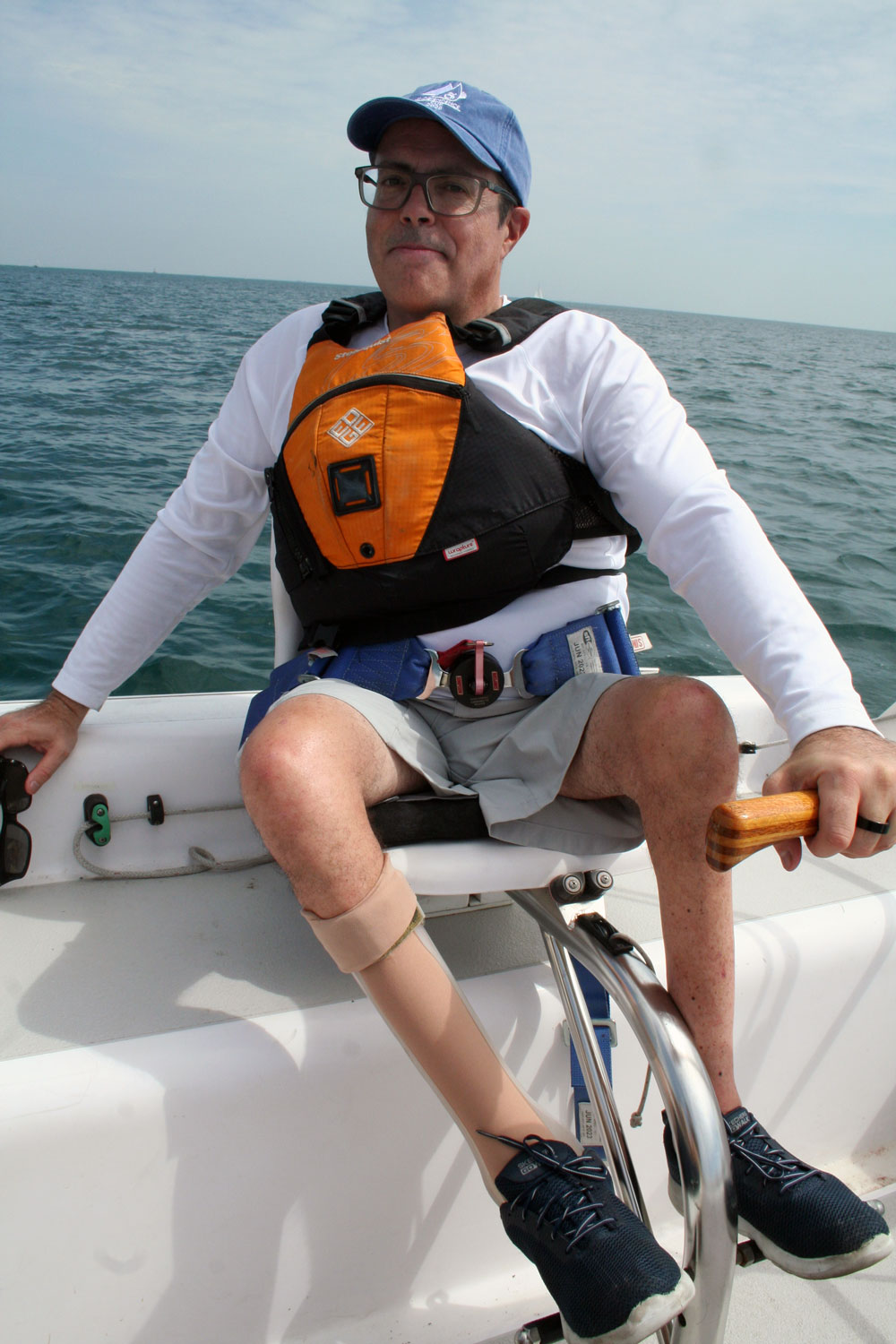The transfer box is Patrick LoDuca’s portal to freedom.
On the dock of Burnham Harbor, LoDuca lifts himself out of his wheelchair and onto the box, a wooden slide that leads to the deck of a 20-foot sailboat. He shimmies down the slide, then climbs into the captain’s chair, from which he can reach the boat’s wooden tiller.
LoDuca was born with spina bifida, a disorder that resulted in several missing vertebrae. He could walk until he was 16, but a corrective surgery that year left him paralyzed from the waist down. He can’t play softball, can’t run, can’t play golf. But he can pilot a boat as well as any able-bodied sailor.
Growing up in Munster, Indiana, LoDuca never sailed, “never had access to the lake,” but from the window of his condo in the South Loop, he would watch Wednesday evening sailboat races, and began to think, “I’d like to do that.”
Wheeling himself down to Burnham Harbor, LoDuca learned about the Judd Goldman Adaptive Sailing Program, which was founded in 1990 to put disabled sailors on the water. Its namesake suffered from bone infection osteomyelitis, which left one leg shorter than the other.
“He became a sailor because he couldn’t do other sports,” says Goldman’s son, Peter, who started the program. “Most disabled sports, like wheelchair basketball, they have special rules. These are the same rules I sail with. Patrick is no different than an able-bodied sailor once he gets in the boat. He can use his arms.”
On LoDuca’s first day down at the lake, he was 40 years old. The program took him for an introductory sail, and he signed up for six lessons for $100, a price that never changes. (In fact, 70 percent of students get a scholarship — the same proportion of people with disabilities who are unemployed.) LoDuca didn’t know any sailors. He didn’t have any friends with disabilities. Sailing as a paraplegic has connected him with both communities. It’s changed his life, he says, “having a mentor, being able to say, ‘Your wheelchair does that.’”
We’re going out for a quick spin on the lake, mostly for the benefit of this writer, who, despite living in Chicago for 30 years, has never been sailing on Lake Michigan. On board are two able-bodied sailors to lift the sails for LoDuca while he steers the boat — the usual crew for a craft this size. In competition, LoDuca usually sails solo, in a 2.4-meter boat. He’s traveled all over the country to race, and in 2022, won the U.S. Sailing Para National Championship here in Chicago. In a few days, he’ll be racing in the Independence Cup, against able-bodied sailors.
“Just the joy of being on the water lifts your spirits,” LoDuca says as the boat chugs toward the breakwater, still under engine power. “The challenge of racing in a sport I didn’t grow up in. Those small boats, there’s nothing an able-bodied person can do to have an advantage. The able bodied, they’ve been racing since they were kids. They know everything, and I still beat them.”
Once we’re out on the open lake, LoDuca’s crew raises the sails, and he takes command of the boat. It’s perfect sailing weather, with flat water and a 10-knot wind, with gusts up to 15 knots. LoDuca executes a few turns, then hands me the tiller. He’s mentored numerous sailors, all of them paraplegics, but now he’s teaching this able-bodied ignoramus.
“Can you feel the pressure?” he asks, as I struggle to keep a grip on the tiller. “That’s the wind in the sails!”
My sailing lesson lasts about 15 minutes. Then LoDuca has to return to shore. He’s got business there. On Friday, he gave the participant speech at the Judd Goldman Adaptive Sailing Foundation’s annual fundraising gala.
“Traditional sailing is almost impossible if you are disabled,” LoDuca told the gathering. “Our adaptive sailing program changes the perceptions of what our disabled participants can do and what they believe is possible in their lives. Over the years, sailing has lifted my self esteem and made me feel more confident and independent.”
On Saturday and Sunday, LoDuca raced. He experienced bad luck in his first race, when the wires that held up his masts broke. In his final race, though, he rallied from sixth place out of seven boats. The winner of the entire regatta was a sailor with a disability, a man who sailed all his life before suffering a stroke a few years ago. Thanks to adaptive sailing, he found a way to stay on the water.
“We’ve got an amputee, a motorcycle accident, spinal cord injury at 18,” says Goldman. “We’ve got a woman who was born with no legs and only one arm. She’s a great sailor. We have blind people on the helm. Once you’re in that boat, if you can steer, it’s so great because you’re on the same level as an able-bodied sailor. It’s mind against mind.”



